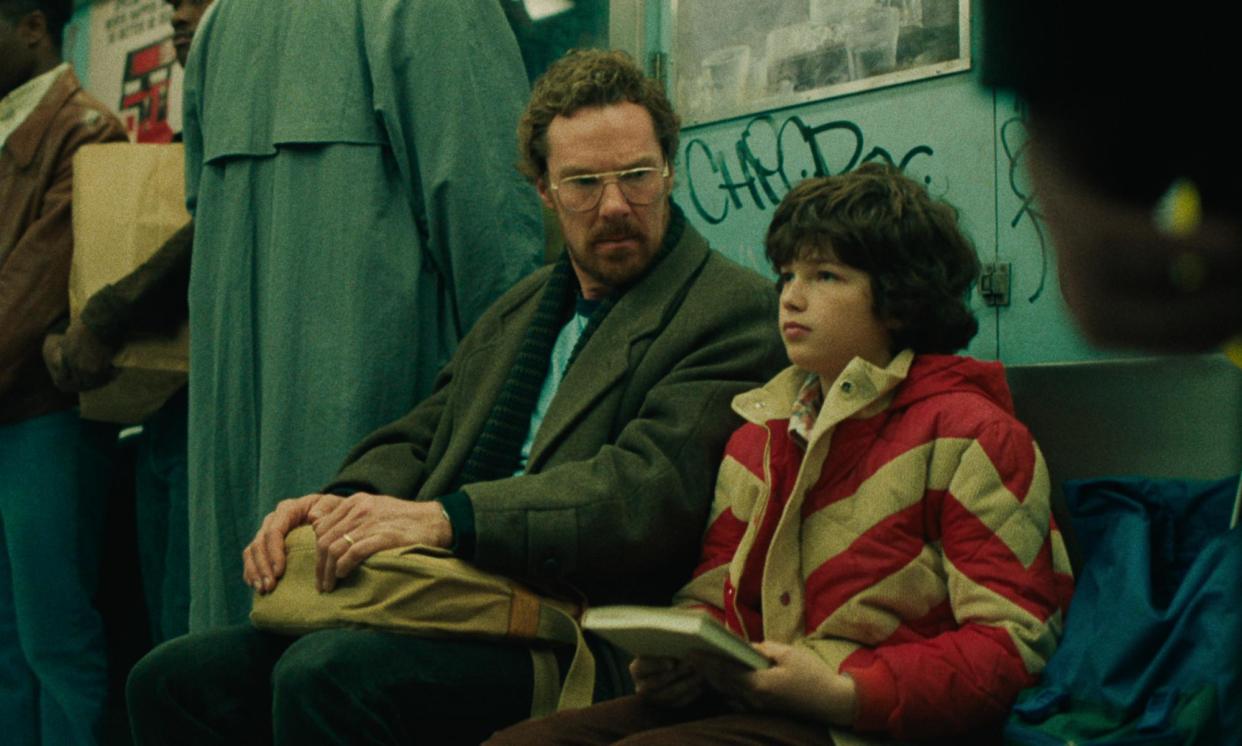Eric review – Benedict Cumberbatch will win awards for this wildly ambitious drama

Eric is that rare sighting – a truly original Netflix Original. The six part series drama written by Abi Morgan (The Iron Lady, The Split) stars Benedict Cumberbatch as genius puppeteer Vincent, the creative force behind a Sesame Street-esque show called Good Day Sunshine. When his nine-year-old son Edgar (Ivan Morris Howe) goes missing on his way to school, Vincent becomes convinced that if he brings to life the new puppet Edgar had been inventing for the show, his son will come home. Enter into the proceedings a 7ft-tall Muppets-meets-Monsters Inc creation called Eric, invisible to others and voiced by Cumberbatch, who follows Vincent round as a manifestation of his hopes, fears, guilt and altogether crumbling mental health.
Cumberbatch-meets-Muppet has, understandably, been the focus of most of the publicity. But in fact, Eric the puppet is a relatively small part of Eric the show, and not the most effective part at that. Cumberbatch, as you might expect, is mesmerising as the viciously narcissistic Vincent, pretty much drunk on his own talent long before he turns to the bottle to cope with Edgar’s disappearance, and psychologically unravelling in the wake of both. His already volatile and shaky marriage to Cassie (Gaby Hoffmann, doing much with a surprisingly thin part) fractures further under the strain and his colleagues begin to desert him too. He is already mostly estranged from his wealthy parents, to the – slightly unbelievable – extent of refusing their offer of reward money for Edgar’s safe return.
The central tension dissipates early on when we learn of Edgar’s whereabouts, and the missing child storyline becomes another slight oddity among what will become quite a distracting little pile of them – merely one of many instead of, as you would traditionally expect, the main consideration of the series.
Instead the drama begins to swell and then sprawl, taking in not just marital breakdown, intergenerational conflict, addiction, infidelity, grief, loss and psychological meltdown but also municipal corruption (we are in grimily glamorous, glamorously grimy 1980s New York and there is barely an institution or individual that is not on the take somehow). It encompasses racial prejudice and politics, child abuse, a drugs and homelessness crisis and the systemic homophobia that has been given a new lease of life with the advent of HIV and Aids cutting its terrible way through the gay community.
The nexus at which most of these meet is NYPD detective Michael Ledroit (McKinley Belcher III), a Black closeted gay man who, at home, is caring for his dying partner. The depth and tenderness of their relationship, sketched in just a few scenes, is heartbreaking. Ledroit is convinced that seedy local nightclub Lux, run by Gator, a sleazy ex-con, is the site of activities even darker than the usual activities that go on in nightclubs run by ex-cons in 1980s New York. He gradually becomes embroiled with Gator and the vice squad cops who infest the place. When Edgar goes missing, he is drawn back to the case of another lost child – a Black boy, Marlon Rochelle, whose mother Cecile (Adepero Oduye) has spent a year fighting to get a fraction of the police or media attention Edgar’s disappearance has automatically received.
Awards will doubtless – and rightly – be given to Cumberbatch for his portrait of Vincent’s descent into hellish despair and madness. But Belcher’s performance is just as much of a wonder. His is a quietly commanding presence, the epitome of calm professionalism but with rage of all kinds pulsing underneath, until he gets home and transforms into a loving and beloved partner – devoted to his boyfriend but still in grief-stricken denial about what the future holds for him.
Eric starts strongly, and while the main focuses are the whereabouts of Edgar (the procedural aspects in a pre-digital age are exquisitely agonising, as Ledroit works his way slowly through the CCTV videotapes, waits patiently for blood test results on the child’s T-shirt and gradually builds his list of suspects), Vincent’s disintegration and the filling in of Ledroit’s backstory work well. But soon the number of plotlines, social issues, themes and characters begin to produce diminishing returns. Even Eric is effectively sidelined and never seems to add more to the story than we could have got from Vincent alone (and perhaps, in Eric’s absence, Cassie might have been given more to do).
You can see why Eric attracted such a formidable cast (alongside Cumberbatch, Hoffmann and Belcher there is also Clarke Peters as a possibly suspect janitor in Edgar’s building, and the secondary character players are all equally strong). The series is an ambitious swing, which is in itself a great thing – and if it misses, that makes it no less admirable an attempt.
• Eric is on Netflix

 Yahoo News
Yahoo News 
